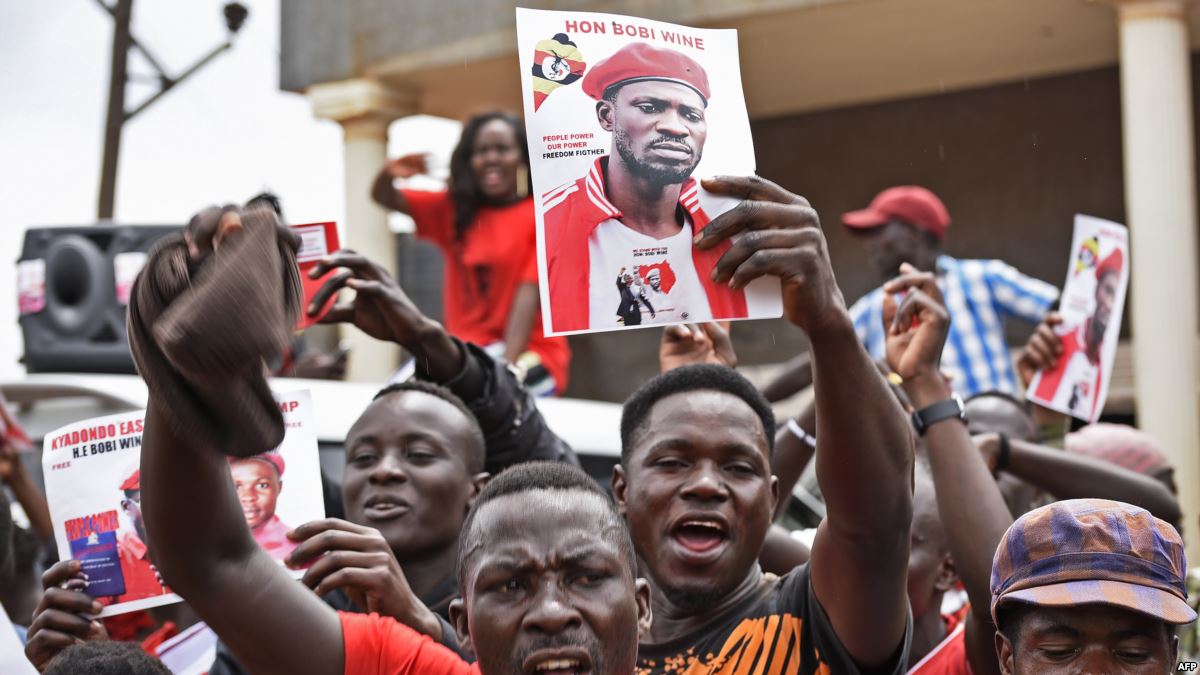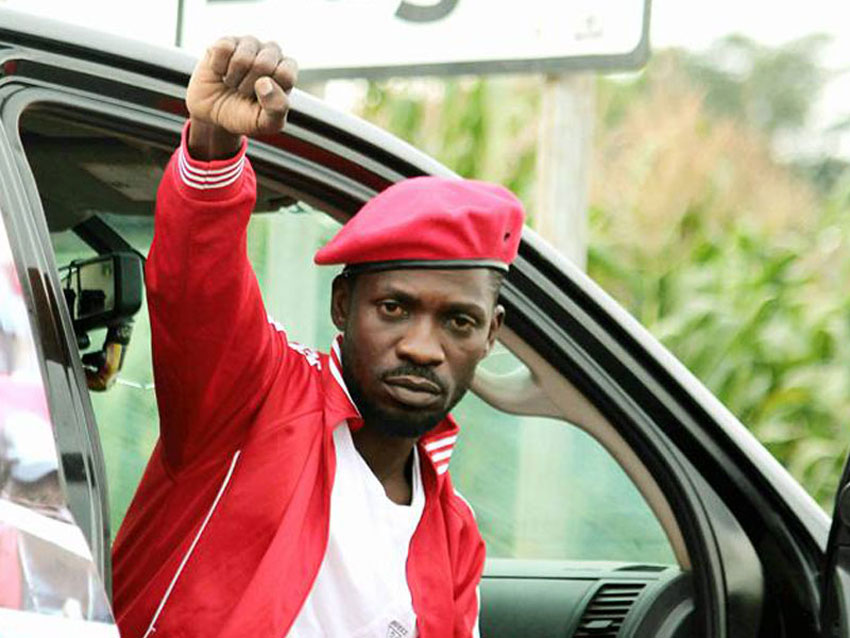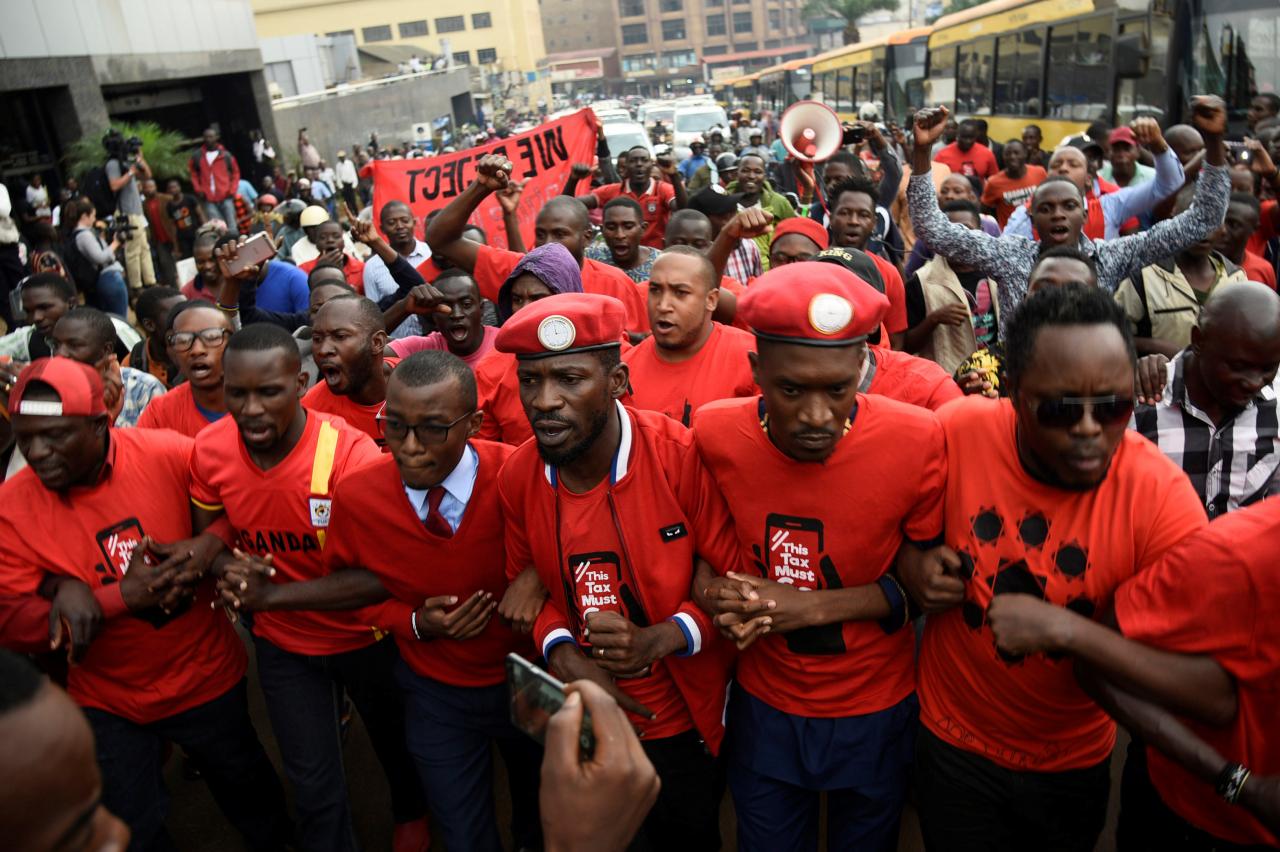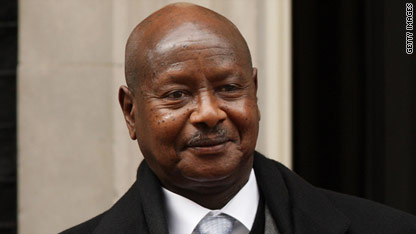My own encounter with “people power”, a phrase I put in a newspaper article in 2010 ( and which subsequently got me, and my editor Henry Ochieng arrested), started off as a discussion at Entebbe Airport with two senior journalists. The two were senior editors. Both were veterans of a bygone era when, following the NRA/M takeover, it appeared for a moment that Uganda was on a progressive path.
Recalling now I could never have anticipated how “People Power” would cause so much anxiety within the higher echelons of Uganda’s political ruling classes. Since the article I wrote was prior to the 2011 Arab uprising in North Africa – I suspect, as I said so in the article itself, that the fear of spontaneous protest is a nightmare for entrenched governments precisely because there is often no other exit available for a situation bred from continuous rule that has been judged to be ruinous and only sustained by force of arms.
In the same breath it is possible to explain why, in Uganda for example, street level agitation no matter how much angst it causes those in power, has not happened. It may grind the powerful and turn their high wall fences, manicured lawns and soft beds into glorified prisons and upon waking cause them to lash out violently by recommending violence against their political opponents – but at best “people power” that is the product of certain socio-economic conditions is a bit far off. There is a lot of people anger however and it has consequences too for rulers and the governed.
The 2010 article was titled “ Preparing for 2011 ( elections) by arming the troops” with a subtitle for the analysis “ Will the people’s power defeat President Museveni at the polls”. I don’t believe, save for bar talk, that I have shared how the entire saga came to be.
The two veteran journalists who initiated this drama were my bosses Wafula Oguttu, (Waf) who had taken leave of the newsroom for a life in politics and David Ouma Balikowa ( whose newsroom moniker was plain DOB). I had chanced on them in deep conversation in the guest section of Departures at Entebbe Airport after seeing off a friend.Though Wafula had a position on the Monitor Publications Board, he more or less continued to act through others like a meddlesome retired coach who showed up at all games and presumed to see his formations on the pitch. Most folks did not mind because Wafula was in fact a fierce advocate for the free press. He was ideologically a socialist. This is a world view I have never had an opportunity to properly question considering the stacks of contradictions that a socialist leaning newspaperman operating in a quasi-capitalist, malformed electoral republic with a military junta might elicit.

As I paid my respects that evening Wafula asked why “experienced” investigative journalists like me had not asked questions and published copy on the very public pass outs of thousands of volunteer “militia” by his old pal the President YK Museveni and Amama Mbabazi – the NRM majordomo who also happened to be Secretary General and Security Minister. I had honestly not paid much attention to what Wafula referred to as the militarization of the country that was ongoing. There was always “stuff” going on the military side of Uganda’s dual republic because the way the government is organized is like a bank. At the front are the receptionists and bank tellers – these are the public institutions of the government like its courts, parliament and administrative units. However at the back were the real managers – the army and in particular its political overlords who implement sometimes parallel agendas through the same state institutions. Journalism rarely addresses this dichotomy. It is a fact of public life perhaps because the fiction sits so close to how Uganda’s view the real rationale for the NRM government which is that after it triumphed against other violent groups embedded within the state and put an end to civil wars – it had “earned the right” to govern until and unless the same conditions or worse returned.
“Look at the numbers” said Wafula. “They are not hiding it” about the commissioning of various “election scouts” NRM/A style of bargain patriotism with political education, basic gun training and promise of salaries. He then launched into a criticism about journalism since he left the newsroom and demanded that we ( working journalists) do something for the country. He was most concerned about the rigging of elections which while it constantly undermines the popular will – we now know is not an effective instrument against mass protests ( which usually happen even after the incumbent has successfully “won” an election with huge margins.
I treated the strong rebuke like a story tip but also out of tremendous respect, for both Wafula and DOB, I took it up with the political editor Henry Ochieng. He commissioned a story as well as an analysis of what the implications were of having this large, irregular force of political cadres active during the election. I then conducted several interviews with members of the Inter-Party Coalition – one of the doomed pre-election opposition attempts to work together. Many of the quotes from the interviews went into the story.
I had been reading a fascinating book by Sterling Seagrave known as the Marcos Dynasty whose significance I only found out when the story ( and analysis) led to my detention along with Mr. Henry Ochieng. It is from this book that I had extracted the phrase “People Power” that had been introduced into the political lexicon after street protests forced the Pilipino strong man and his infamous spouse Imelda Marcos out of the country after winning the general election of 1986. This happened just as the NRA/M was itself wrapping up the “protracted peoples war” and taking power. Seagrave’s book is an intense look into how Ferdinand Marcos, the political genius who had ruled the Philippines for 21 years had gone from wonderkid to aging autocrat with hardly any control of the corrupt patronage that was sustaining the political system keeping him in power. His wife and her brothers run a racket within the state-military and economic sectors almost independent of his influence. It was in part the brutal repression unleashed by the elite afraid of losing their wealth and status ahead of the 1986 electoral showdown that was partly responsible for how things ended. Unknown to me at the time within the NRM intellectual circles of the late 80’s and 90’s, the Marcos affair had been in discussion not least within the cabinet – and the term the “Marcoses” was already being used within the intimate NRM family to refer derogatively to their members who were rapidly getting used to the trappings of power and living a life of privilege and luxury unrecognizable from their ideals during the bush war.
It was Miria Matembe, the ethicist matriarch of good governance within the cabinet, who told me what a denigrating term it was to be called a “Marcos”. It then made sense because even months after our arraignment in court I was trying to understand why the story and its analysis struck such a nerve and caused so much heartache. The police under Gen Kale Kayihura was being pressured to teach us at the Monitor (and me and Henry Ochieng in particular a lesson.
Before Miria Matembe explained to me the trip wire that Marcos was I had met with Bruce Kyerere then law society President and “Aunt” Joy Kabatsi who had known me since my secondary school days. Joy was the head of the legal department at State House but could offer me no real leads on why the pressure was so intense. Luckily for me and Ochieng when we were hauled into court ( the affair happened late at Makindye with the intention we suspect that we would be time barred which really demands another story because our bail application brought together so many people including Wafula who stood surety and my pal Hussein Kashillingi – a lawyer and also former legal advisor to Museveni) friends managed to mobilize a court room to bring forward the bail application and send us home.
Another fact of sheer co-incidence was that the copy of “ The Marcos Dynasty” that I had in fact belonged to Eriya Kategaya. It had his signature and I soon afterwards returned the copy to him through his daughter Julie with whom we were working at the Monitor. It appears that this copy of the book came to my home after it had been lent to my cousin aunt by one of the Kategaya daughters she went to school with in Nabisunsa Girls. I had randomly picked it up and got hooked on the story.
So perhaps it was the insult implied in the use of the Marcos example or the real fear for street protests in my analysis which rereading the article now interviewed several politicians and strategists about the embedded risk of public unrest and the limits ( my emphasis) of the use of force in case an electoral dispute erupted ( as was the case in Philippines when Marcos lost the election amidst a clamor for reform and then rigged the result). The offensive article in 2010 was in fact barely ahead of its time. As the court case dragged on the governments in Tunisia, Egypt and then Libya imploded under the pressure of street movements. Since the basis of our defense in court was that the article and its analysis was honest and fair comment – the examples in north Africa essentially made it moot.
My own conclusion in 2010 had been that where governments are fully entrenched especially through the socialization of violence (say through the large numbers of “election scouts” later known as Crime Preventers in 2016) such an iron grip would only be undone through seismic social movements or disruptions. These riots or mayhem whether organized or organic were a natural reaction to the irresolution of “illegitimate “government.
Politics, as it has been said, is the management of expectations. But this is easier said of the governed than those who govern. Often the rulers – especially those who through the arc of history have achieved a godlike status have no one to manage their own expectations.
To put it differently leaders and their supporters, especially those with the violent means to defend the status quo, are at all times outnumbered by the governed. That is why when waves of the governed act together power, no matter how violently disposed rulers are, they can withstand it. They also often fail to predict that moment and as noted in places like the Philippines ( add Libya, Egypt and Tunisia) these waves rock political homes thought to be safe because of the violence safety nets cast deep and wide by regimes through investments in the security services, army and irregular forces or militias.
It also raises another issue with regard to H.E Bobi Wine a.k.a Robert Kyagulanyi whose movement uses the phrase “People Power” to gesture to the full force of such action ( his current partner Dr. Kizza Besigye with whom I have even more encounters famously referred to this force as a tsunami). The fact that protest movements in Uganda have not succeeded yet I think comes to one essential problem.
In Uganda the political opposition, in my opinion, does not articulate or propagandize broad social goals ( the kind that speak directly to the interests of the masses) and instead cluster around political goals ( taking power). Even where voters are disaffected, the fact that they are mobilized to act within the confines of an election constrains any social agenda that needs refining to get masses of people to act together to change ( to use YK Museveni’s own term “ fundamentally”) the direction of the country.
In some cases, few of them I may add, the acts of defiance directly challenge and reject the legitimacy of the Establishment to, for example, hold these same politicians to some legal standard of accountability through sham trials. These are aligned broadly to social justice and fairness. This is the emotional content of Bobi Wine’s people power I suspect. Sadly however they are not further refined as social causes and not interpreted further.
In contrast the Movement under YK Museveni has a different version of the same problem. It has a more refined and propagandized social agenda ( Middle Income, wealth creation and self-improvement). However even if it sees itself as a mass organization ( which can be seen during its own primaries) and while its leader has chosen “social transformation” as his legacy instrument – in practice the NRM is tethered to short term political goals.
Its balkanization of the country into small political districts argued as “service delivery units”, the linking of various development agendas to political support and votes and the evil bargain it has done with “peoples representatives ( where MPs are allowed to create a vibrant market for votes which they then trade for large salaries and benefits) has turned the exercise of power into a large commercial exercise that dwarfs any meaningful social change in the drab performance of elections.
The political establishment ( opposition and ruling) share one illusion – which to be fair is the way that power works; politicians honestly believe that by holding on to the levers of power they are simultaneously managing society. The two are related but not the same. It is like a boat captain who in a voyage is confident of his ship believes he/she is the master and commander of the seas. When a tsunami caused by factors existing out of his control or belief turns the tides, he is unprepared and dooms the crew and passengers in his charge.
A related observation here is that while states are inevitable today ( that’s how society is organized within the rigid ritual of government) they are not absolute. Social movements often spring up when people realize what they want is essentially the same thing and the way they are currently organized no matter its traditions and rituals does not speak to the future they long for.
When change does not happen, it is because on a balance the ruling elite are either capable of sustaining their narrative albeit with the help of the tools of state control or more often because the conditions that underpin change are in fact absent. The opposition in these “changing” societies, as is the case in Uganda today, simply does not gesture in a meaningful and organized way to the underlying shared social goals that fuel change. A harsher indictment is that they represent political society and not necessarily the society itself.
I recently put the issue of people power like so; if Bobi Wine ( as he did) and the Kabaka of Buganda calls for protest, which one will the “masses” likely heed? The answer to that lies in the fact one of the two represents a broader social consensus and the other does not. The factors outside of politics in other words are what is there to watch.

Most people are conditioned to work within the social limits commanded by the powerful. They define their own goals within the conditions that are formed by that reality. But from time to time they wake up to the realization that a better reality is possible. They get there not just because of political competition as it is assumed in a democracy is neatly presenting them with alternatives like a menu in a restaurant. No they often get radicalized because they have been pushed and shoved by elite classes far too absorbed with their own enrichment to care and far too comfortable with the use of force to silence those who say otherwise. The individual who wants change is also less likely to act simply because he thinks change is good. He will move on the reasonable assumption that what he wants is also what his neighbors and their neighbors want.
When he stays at home it is an indictment on those who wish to refresh leadership that they have not done the work. A good test I use myself is to step outside on the street and ask “ Are these my neighbors and what do I have in common with them?”










